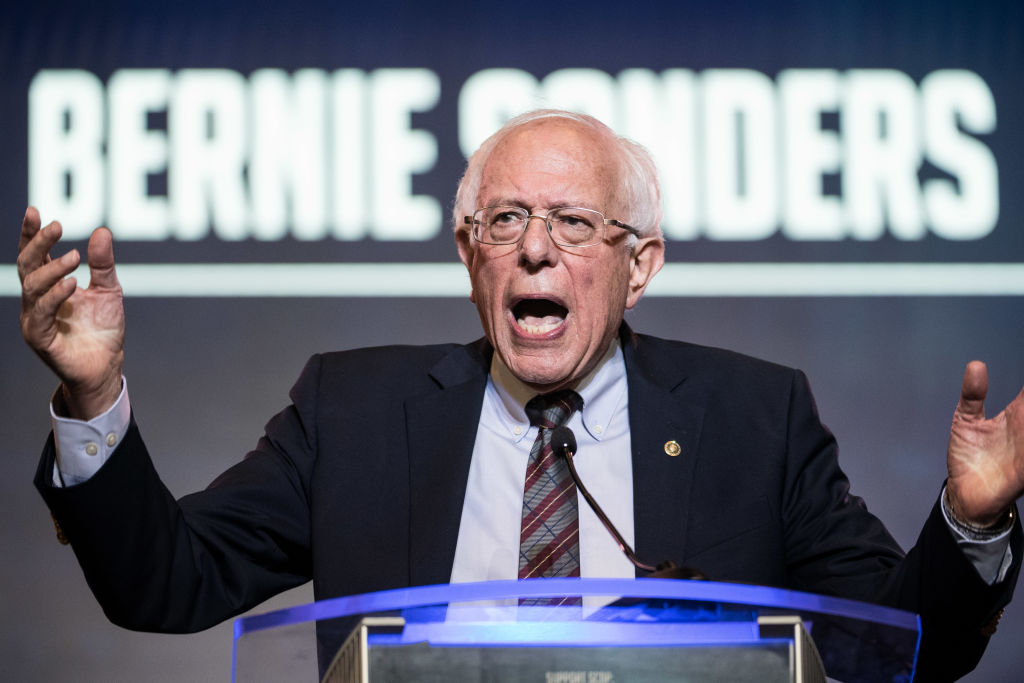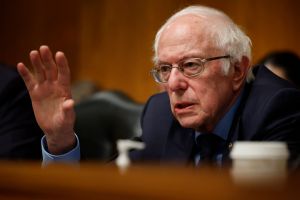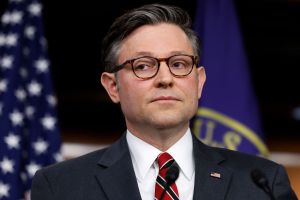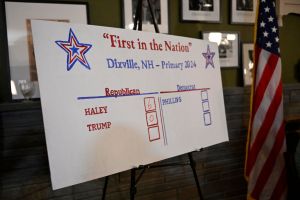Anton Gunn was holding court at the South Carolina Democratic Convention this weekend, eager to regale journalists with tales of the vaunted Barack Obama primary campaign in 2008. Obama’s landslide victory in South Carolina over Hillary Clinton that year propelled him to indomitable front-runner status, and Gunn, per his own telling, was the very first person Obama hired in the state. ‘The first time he landed in South Carolina, I picked him up in my car and I drove him to his first event,’ Gunn said. ‘So I took my daughter’s car seat and put it in the back, and swept the Cheerios out of the seat, and he sat in the backseat of my Chrysler Pacifica to go to his first event, where I had to beg six people to come and meet with Barack Obama, because everybody told me they were going to be with Hillary.’
Gunn was eventually named State Political Director for South Carolina in the Obama campaign, and later joined the Obama-Biden administration in the Department of Health and Human Services. But if anyone was expecting him to take a conciliatory approach to the entire Democratic presidential field this year – now 25 candidates total, after the eye-roll campaign announcement Sunday of former Pennsylvania Rep. Joe Sestak – they would be wrong. ‘Bernie Sanders has never been a Democrat – he should’ve never been allowed in the Democratic primary,’ Gunn declared.
That’s an often heard sentiment when discussing Sanders with professional class Democratic officials such as Gunn. They’re generally positive about every other candidate, even if they might favor one over another; Gunn noted that his former colleagues from the Obama campaign and administration have flocked to Biden, Beto, Warren, Harris, Booker, and others. But with regard to Bernie, there is simply no quarter paid. ‘He’s never been a Democrat, till it became politically expedient for him to say, I’m a Democrat,’ Gunn said. ‘He chose to be an interloper.’
Sanders faces a paradox: his status as an ‘interloper’ is what endeared him in the first place to his most devoted support base, but he has also generated unique disdain in elements of the party that he would almost by definition need to court in order to win a sufficient number of delegates. He can’t relinquish his position as a party ‘outsider’ of sorts, or risk alienating the people most committed to him, but he also must ingratiate himself to some marginal extent with the party ‘insiders’ who still play an outsized role in the nomination process.
It’s all the more ironic because Sanders has made extra effort lately to portray himself as a ‘team player,’ perhaps against his own foundational political instincts. He has co-written op-eds with Sen. Chuck Schumer, slogged through an awkward ‘unity tour’ with DNC chief Tom Perez, and just this past Sunday reminded Margaret Brennan of Face the Nation that he is a member of the Democratic leadership in the Senate. And yet the fact that he is technically not a registered Democrat per voter rolls in the state of Vermont still consistently angers party chieftains, probably to an irrational degree. For all intents and purposes, Sanders is correct that he is functionally a Democrat. Yet his detractors latch onto this ultimately arbitrary distinction – the fact that an ‘I’ appears next to his name rather than a ‘D’ – in order to portray him as some kind of meddling adversary rather than someone who has put a lot of effort into electing Democrats all over the country. He’s done this with special gusto since the 2016 primaries, but it’s not a new phenomenon. In 1988, for instance, he was one of the vanishingly few white elected officials of any prominence to endorse the presidential candidacy of Jesse Jackson, who had also been regarded in many quarters of the party as an inconvenient ‘interloper.’ I asked Sanders for his recollection of that time period after an event this Saturday in Columbia, S.C.
‘My memory is that Jesse Jackson has played an extraordinarily important role in the fight for justice in this country, and I think he doesn’t get the credit that he deserved,’ Sanders told me.
Jackson was widely regarded as a factional black candidate whose principal goal was to foment division within the party. So incensed were some of Sanders’s constituents by his support for Jackson that one of them actually physically attacked him. As the New York Times reported at the time:
‘Lyman Hunt of Burlington, who took the podium to speak in support of Mr Gore, said, “I resent intruders who would undermine and destroy the Democratic party.” One voter, Helen Malloy, yelled from the back of the auditorium, “We want unity among ourselves, not with a group of outsiders.”
Several minutes later, she approached Mayor Sanders as he was returning to his seat after casting his vote and slapped him on the cheek. The Mayor, who at first appeared to think that the woman was about to greet him, looked stunned.
“I don’t think that was very nice,” he told her.’
Reflecting on the episode, Sanders told me: ‘That was at a Democratic caucus in Burlington, when I was mayor of the city. And people resented that we were standing up to the Democratic establishment in the state at that time. And Jackson won in Vermont.’
It’s true: Jackson narrowly won the Vermont caucus that year, one of his few victories outside the Deep South. And he won because the caucus was dominated by activists and organizers, deemed ‘outsiders’ by the irate constituent – the same sorts of people Sanders now is banking can lift him to a plurality of Democratic delegates to secure the 2020 nomination.
Jesse Jackson himself remembers the episode and credits Sanders for his decades-old stance. ‘I support him very much for that,’ Jackson told me while milling on the convention floor Saturday – making sure to underscore that Bernie did in fact take a risk to back him when it was not politically popular. ‘It’s the truth. He did. It’s not fake news. It’s not false advertising.’
Much as his reminiscences about Jackson might rouse fond memories among a certain activist segment of the party, Bernie’s prospects for winning South Carolina outright have to be viewed as challenging, to say the least. He was routed by Hillary Clinton in 2016, losing by approximately 47 percent. Current polling may not necessarily be predictive at this stage, but he’s being similarly trounced by Joe Biden if you take the latest numbers at face value. Much of this can be attributed, not surprisingly, to the fact that Biden was at the side of Obama for eight years, and Obama is still wildly popular within the party, especially in South Carolina, where a majority of the primary electorate is black. Memories of Obama, and by extension Biden, are overwhelmingly fond.
Nina Turner, a national co-chair for the Sanders campaign, addressed this with dynamic some ferocity. ‘I can’t criticize people’s fond memories. What I can say is that each candidate that is running right now has to run on their record. This is not about proximity to the first African American president. And let me further say – I didn’t want to go here, but I’m going – it is an insult to the African American community. We are the only ethnic group in this country where people decide that we’re going to vote for somebody just because of their proximity to the black president. Insult,’ she said.
‘It’s old. This person was close to President Barack Obama, therefore we’re going to vote for them. That happened in 2016 – where did it get us?’
Still, a noticeable portion of rank-and-file primary voters appear to have absorbed anti-Sanders talking points such that they express unusual antipathy for him. One woman attending the Fish Fry hosted last Friday night by Rep. Jim Clyburn – to which 21 of the then-24 candidates flocked – said she blamed Bernie for Hillary Clinton’s loss, claiming that he did not sufficiently coalesce around the party’s eventual nominee. ‘He acted like a spoiled child. He didn’t win, and he couldn’t accept it gracefully,’ said the middle-aged black woman, who would only identify herself as ‘Jane Q. Public.’ She claimed to have read the Mueller report, and said it concluded that Bernie had been the beneficiary of Russian help – part of the broader Putin-directed effort to sow discord in the American polity. ‘They targeted him, yes. Somebody in his camp encouraged him, and they were encouraged by the Russians.’ Her problems with Bernie ran the gamut: from political to temperamental. ‘We got a president with an ego problem, we don’t need another one with an ego problem,’ she said.
Bernie might have an ‘ego,’ but he would be far from alone in that respect. What is unique is the animus that he alone seems to generate. But again, paradoxically, the animus that he generates among certain recalcitrant segments of the party is exactly what endears him to his core supporters. It’s still unclear how Bernie will manage to navigate that tension – at least without getting slapped.


















